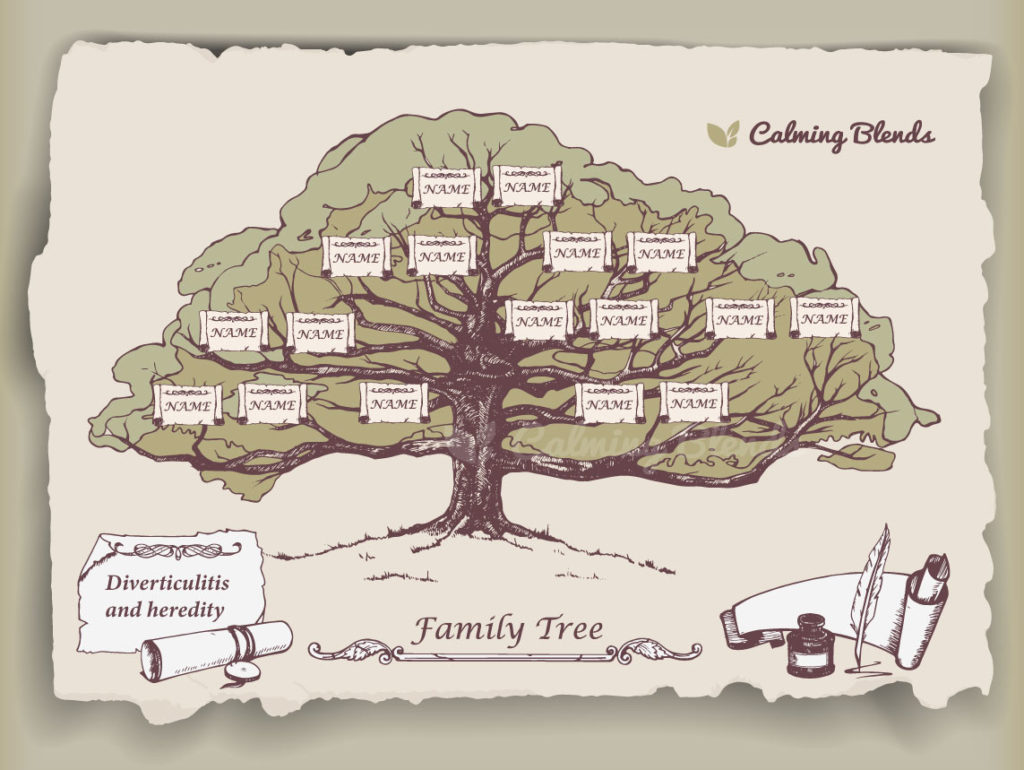Is Diverticulitis Hereditary?

Is Diverticulitis Hereditary?
To answer the question “Is Diverticulitis Hereditary?” let’s learn how diverticular illness and one of its most prevalent sub-conditions, diverticulosis, are related to colon health. Diverticulosis is a very frequent issue that can result in major complications or no symptoms at all. The colon is an extremely delicate organ that is vital to the digestive system. Proper colon health not only makes life easier, but it also prevents numerous significant medical complications and, in some cases, surgery. However, due to our collectively worsening diets in the United States, poor colon health has resulted in an increase in bowel related disorders, colon and rectal cancer, diverticulosis, and subsequent diverticulitis.
So, what exactly is diverticulosis?
Diverticulosis is caused by a weakening of the colonic wall, which results in the formation of tiny pockets within the colon. It is a highly prevalent condition that affects the majority of people by the time they reach their fifties and sixties. Diverticulosis is not always a concern; nonetheless, it raises the chance of diverticulitis, which is an infection in the pockets mentioned above.
Is diverticulitis hereditary, or can it be treated and prevented?
As with other intestinal illnesses, heredity influences the onset and severity of some conditions, including diverticulosis and diverticulitis. In other words, if close family members have had diverticulosis, your risk may be slightly increased as well.
However, your genes and family history are not the primary causes of diverticulosis. In fact, there are numerous more factors that patients should be aware of that raise the likelihood of developing diverticulosis:
- The first consideration is age. Diverticulosis becomes more common as we age because our muscle and tissue strength deteriorate.
- The second issue is straining during bowel motions (causing pressure on the colonic walls). Chronic dehydration and a lack of fiber in the diet are frequently to blame. Both of these make it more difficult for the colon to produce and remove mass. Indeed, countries with high fiber diets appear to have the lowest incidence of diverticular illness.
- The third consideration is stress. Diverticulitis becomes a problem when stress is added to the equation.
This is due to bodily impulses that respond to stressful events by redirecting oxygen and blood from the digestive tract to the brain and muscles. As a result, both the digestive and immunological systems are prone to diverticula attack.
Our final say about heredity and diverticulitis
Finally, while diverticular illness, particularly diverticulosis, can be inherited, patients should not take it for granted. On the contrary, if you know you have a hereditary susceptibility to diverticulosis, you should increase your water and fiber consumption to reduce your risk.
While not all cases of diverticulosis progress to diverticulitis, the latter is a dangerous disorder that sometimes necessitates the removal of a portion of the colon, known as a colon resection or colectomy. While today’s medical and surgical technologies have made colon surgery less invasive than ever before, depending on the overall health of the bowel, there is still the possibility of a temporary or permanent colostomy.
The same health conditions that raise the chance of diverticulosis also raise the risk of colon and rectal cancer. Cancers of the colon are more common in patients who have a poor diet that is high in calories, low in nutrients, and low in fiber. As with any significant medical condition, prevention is far superior to treatment. The same health conditions that raise the chance of diverticulosis also raise the risk of colon and rectal cancer. Cancers of the colon are more common in patients who have a poor diet that is high in calories, low in nutrients, and low in fiber. As with any significant medical condition, prevention is far superior to treatment. The same health conditions that raise the chance of diverticulosis also raise the risk of colon and rectal cancer. Cancers of the colon are more common in patients who have a poor diet that is high in calories, low in nutrients, and low in fiber. As with any significant medical condition, prevention is far superior to treatment.
The best approach to avoid diverticulitis is to make changes to your food and lifestyle.
Here are a few recommendations:
- Consume additional fiber by eating whole-grain breads, oats, bran cereals, fibrous fresh fruits and veggies. Take care, though, to introduce fiber gradually. A rapid change to a high-fiber diet can result in bloating and gas.
- Supplement your diet with an over-the-counter psyllium supplement made from the plant Plantago psyllium. Try ground psyllium seed as well: Add 1 teaspoon ground psyllium seed to any cold liquid once a day and drink within a few minutes of preparation, before the combination gels.
- If you increase your fiber intake, make sure to drink lots of fluids (at least eight 8-ounce glasses of water each day).
- Refined foods, such as white flour, white rice, and other processed foods, should be avoided. Here are some additional foods to avoid if you have diverticulitis.
- Attempt over-the-counter stool softeners to avoid constipation. However, without consulting your doctor, do not use suppositories or laxatives for constipation on a long-term basis. Natural laxatives include prunes, prune juice, and psyllium seed. Specially made teas to combat constipation are available in health food stores, but some of them can be quite potent, so use them only as suggested. Avoid products containing senna (Cassia senna), which is a very potent herbal laxative that can become addictive. Senna can also induce staining of the colon lining, which can lead to a disorder known as melanosis coli. Polyethylene glycol (MiraLax) is an effective laxative for relieving constipation in the short term. Long-term constipation can be treated with prescription medicines such as Amitiza. Discuss these drugs with your doctor.
- Regular exercise is essential. Exercise can help your intestine’s muscles preserve tone, which promotes regular bowel motions. If you have the urge to urinate, don’t put it off or ignore it.
In conclusion, to answer the question “Is Diverticulitis Hereditary?”, aging and heredity may be causes of diverticulosis and diverticulitis, but diet also plays a role. A diet high in processed foods and poor in fiber may raise the risk.
Sources used as reference for this blog (Is Diverticulitis Hereditary?) :
WebMD : https://www.webmd.com/digestive-disorders/understanding-diverticulitis-treatment
Mayo Clinic: https://www.mayoclinic.org/diseases-conditions/diverticulitis/symptoms-causes/syc-20371758
MasJax: https://www.masjax.com/is-diverticulosis-hereditary/
Calming Blends health’s content is for informational and educational purposes only. Our website is not intended to be a substitute for professional medical advice, diagnosis, or treatment.
